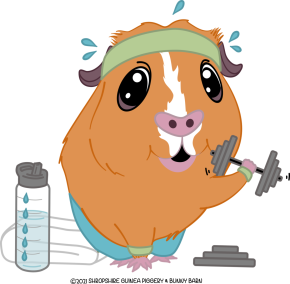
Scurvy & Vitamin C
Scurvy is also known as hypovitaminosis C.
Signs of Scurvy include:
- Difficulty walking due to swollen joints
- Small wounds may bleed excessively or not heal as rapidly as normal
- Hair loss and Bald patches
- Poor skin and coat condition
- Loss of appetite with subsequent weight loss
- Diarrhoea
- Difficulty eating
Scurvy occurs because guinea pigs cannot make their own vitamin C, and must ingest adequate levels in their diets to remain healthy and prevent Scurvy. Guinea pigs require between 10-50 mg/kg daily to maintain good health depending on their size. The smaller the pig, the less they need (ie 10mg) and the bigger the pig the more (50mg).
Preventing Scurvy
Vegetables high in vitamin C that are suitable for guinea pigs include parsley, broccoli, kale, red and green peppers. Other dark green leafy vegetables are also a good source of vitamin C are other options, as they are easy to find and store while maintaining a good level of vitamins and minerals. Guinea pigs that develop scurvy will often require supplementation with injectable vitamin C to increase the rate of recovery, as well as prevent further deterioration. They can then be maintained on an oral supplement while the diet is being improved.
With good owner education giving a Guinea pig the correct amount of Veggies, many guinea pigs will do well after a diagnosis of scurvy.
How to make sure you are giving your guinea pig Vitamin C to prevent Scurvy.
Guinea pigs should have Vegetables every single day, to ensure a stable level of Vitamin C in your guinea pig.
One large chunk of Pepper contains all the Vitamin C a guinea pig needs a day, but it is always appreciated by your Guinea pig to give them different veg and a varied diet. Even we get tired of eating the same thins day after day.
Vitamin C has a half-life of approximately 10 days in vegetables. This means that from the point of being harvested, the amount of viable Vitamin C contained within the food decreases by half every 10 days. Always feed vegetables, greens and fruit as fresh as possible for maximum nutrient content.
Seriously consider whether additional supplementation is necessary. Adequate Vitamin C should be achieved easily through a varied diet and they should not need any extra added to water etc. We do not give Vitamin drops in water bottles. They don't need it as too much Vit C can also be harmful.
If your guinea pig is poorly or has a condition where additional supplementation is required, this should always be under the advice of a good exotic vet.
Did you know?
Young Guinea pigs under 6 months are at greater risk because of rapidly developing bone and increased use of vitamin C.
Although guinea pig pelleted diets are fortified with vitamin C, the content is reduced by storage, light, heat, and moisture. As much as 50% of vitamin C activity can be lost within 6 weeks of storage; therefore, it is recommended to feed product within 90 days of production.
Vitamin C activity is diminished by water, so supplementation of drinking water may be ineffective anyway by as much as 50% of activity is lost within 24 hours

